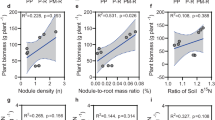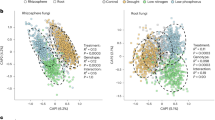Abstract
THE inability of the herbicide 4-chloro-2-methyl phenoxyacetic acid (MCPA) to control certain dicotyledonous weeds can be overcome by introducing into the molecule a single α-alkyl substituent1. DL-α-(4-chloro-2-methylphenoxy) propionic acid (CMPP) is now widely used to control Galium aparine (cleavers), an important cornland weed.
This is a preview of subscription content, access via your institution
Access options
Subscribe to this journal
Receive 51 print issues and online access
$199.00 per year
only $3.90 per issue
Buy this article
- Purchase on Springer Link
- Instant access to full article PDF
Prices may be subject to local taxes which are calculated during checkout
Similar content being viewed by others
References
Lush, G. B., and Leafe, E. L., Proc. Third British Weed Control Conf., 625 (1956).
Fang, S. C., Weeds, 6, 179 (1958).
Fang, S. C., and Butts, J. S., Plant Physiol., 29, 56 (1954).
Jaworski, E. G., and Butts, J. S., Arch. Biochem. Biophys., 38, 207 (1952).
Andreae, W. A., and Good, N. E., Plant Physiol., 32, 566 (1957).
Author information
Authors and Affiliations
Rights and permissions
About this article
Cite this article
LEAFE, E. Metabolism and Selectivity of Plant-growth Regulator Herbicides. Nature 193, 485–486 (1962). https://doi.org/10.1038/193485a0
Issue Date:
DOI: https://doi.org/10.1038/193485a0
This article is cited by
-
Separation of chlorophenols on a cation-exchanger in Ce(III) form
Chromatographia (1984)
Comments
By submitting a comment you agree to abide by our Terms and Community Guidelines. If you find something abusive or that does not comply with our terms or guidelines please flag it as inappropriate.



